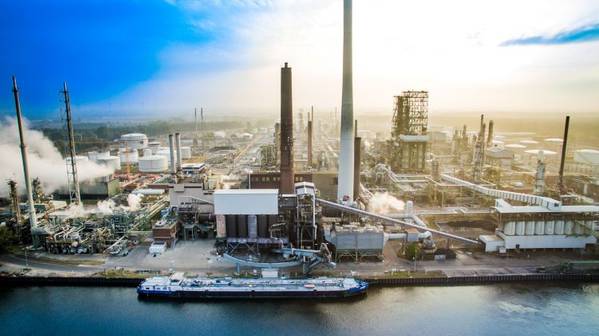
British oil major BP and Danish wind developer Ørsted have signed an agreement to work together to develop a project for industrial-scale production of green hydrogen in Germany.
Green hydrogen is made by the electrolysis of water using renewable power, producing zero emissions.
In their proposed Lingen Green Hydrogen project, the two firms intend to build an initial 50 megawatt (MW) electrolyzer and associated infrastructure at bp’s Lingen Refinery in north-west Germany. This will be powered by renewable energy generated by an Ørsted offshore wind farm in the North Sea and the hydrogen produced will be used in the refinery.
Under their LOI, bp and Ørsted will now work together to further define the project, agree on definitive documents, and plan to make a final investment decision (FID) early 2022, subject to appropriate enabling policies being in place. The companies anticipate the project could be operational by 2024.
Electrolysis splits water into hydrogen and oxygen gases. When powered by renewable energy, this produces ‘green’ hydrogen, without generating direct carbon emissions. Hydrogen is widely used in refinery processes where – as in Lingen – it is now typically produced by reforming natural gas, which does result in CO2 emissions. This is also known as ‘grey’ hydrogen.
Dev Sanyal, bp’s executive vice president for gas and low carbon, said: “Hydrogen will have an increasing role to play in meeting the energy demands of a decarbonizing world. And we are determined to build a leading position in this emerging industry. Bringing together Ørsted and bp, Lingen Green Hydrogen offers the opportunity both to accelerate significant emissions reduction in our refinery and build experience of large-scale green hydrogen production and deployment. This has the potential to play an important role in the development of a hydrogen economy, in Germany and beyond.” Photo: Borkum Rifffgrund 2 wind farm - Credit: Ørsted
Photo: Borkum Rifffgrund 2 wind farm - Credit: Ørsted
Martin Neubert, executive vice president and CEO of offshore wind for Ørsted, added: “Heavy industries such as refineries use large quantities of hydrogen in their manufacturing processes. They will continue to need hydrogen, but replacing the current fossil-based hydrogen with hydrogen produced from renewable energy can help these industries dramatically lower their CO2 footprint. But first, renewable hydrogen has to become cost-competitive with fossil-based hydrogen, and for that we need projects such as this with bp’s Lingen refinery which will demonstrate the electrolyser technology at large scale and showcase real-life application of hydrogen-based on offshore wind.”
According to BP, in the coming decades, hydrogen is expected to play a critical role in decarbonizing the power, industry, and transport sectors, especially those that are hard-to-electrify or expensive-to-electrify. BP said that the development of businesses in emerging technologies such as hydrogen and carbon capture use and storage (CCUS) is an "integral part" of BP's strategy of transforming to an integrated energy company.
In addition to green hydrogen production, bp and Ørsted intend to focus on maximizing the efficiency of the project’s electrolysis system, including assessing sustainable uses for the main by-products of the process, primarily oxygen and low-grade excess heat.
The project is also intended to support a longer-term ambition to build more than 500MW of renewable-powered electrolysis capacity at Lingen. This could provide green hydrogen to both meet all the refinery’s hydrogen demand and provide feedstock for potential future synthetic fuel production.
BP and Ørsted have together applied for funding for the Lingen Green Hydrogen project from the EU Innovation Fund – one of the largest funding programs for innovative low carbon technologies, focusing particularly on energy-intensive industries.
The Lingen Refinery processes about five million tonnes of crude oil a year (c 100,000 barrels a day), producing fuels, heating oil and chemical feedstocks. In 2018 Lingen conducted the world’s first trial of green hydrogen in a fuels refinery.